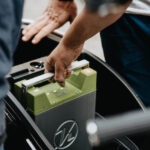High-Stakes Legal Battle Erupts as Renowned Energy Storage Company Faces Lawsuit Over Battery Fire
In a shocking turn of events, a devastating battery fire has set the stage for a high-stakes legal clash between a prominent energy storage company and a well-known tourist destination. The case, sourced from China Judgments Online, sheds light on the catastrophic consequences of battery-related accidents and the intricate legal intricacies surrounding compensation claims. As both parties grapple with substantial losses, the final court ruling is expected to have far-reaching implications for the burgeoning energy storage industry.
On January 30, 2015, a contract named “Electric Boat Refitting Agreement” was inked between the tourist destination (Party A) and the energy storage company (Party B) in China. According to the contract, Party B was entrusted with the retrofitting of electric boats using nickel-hydrogen battery energy storage systems, alongside the design and installation of charging piles and distribution cabinets. The agreement encompassed 30 sets of battery systems for electric boats, with a total contract value of 4.2 million yuan ($651,500).
Tragedy struck on March 2, 2019, when a fire erupted on an electric boat docked at the destination’s pier, causing an inferno that destroyed 11 electric boats and 11 charging piles. The ensuing fire and smoke necessitated an immediate evacuation, resulting in the suspension of the tourist destination’s operations until March 22, 2019, for firefighting efforts and environmental rehabilitation. Furthermore, the remaining refitted electric boats were suspended from operation.
The legal saga continued when one of the electric boats spontaneously combusted and exploded on November 5, 2020, while not in use. In response, on March 16, 2021, the tourist destination brought the energy storage company to court, marking the culmination of this complex legal battle. The case was settled in its final appellate stage in January of this year.
The primary claims made by the tourist destination in the initial lawsuit included:
- Rescission of the “Electric Boat Refitting Agreement” signed on January 30, 2015, and an order for the energy storage company to refund the contract price of 4.2 million yuan.
- Retrieval of the nickel-hydrogen battery energy storage systems and charging piles/distribution cabinets involved in the case.
- Compensation of 2,744,452.71 yuan for firefighting and environmental restoration expenses incurred due to the fire incident.
- Compensation of 3,588,300 yuan for business interruption losses resulting from the fire incident.
The first-instance trial of the case revolved around three main points of contention between the two parties:
- Quality Standard for Battery Systems: The contract did not explicitly define the quality requirements for “nickel-hydrogen battery energy storage systems.” However, the contract stipulated that Party B must ensure that the provided products comply with relevant national regulations. Despite being a recommended national standard, the “Ship Battery Device” standard (GB/T13603-2012) should be adhered to when no mandatory national quality standards are present. The court deemed this standard applicable, especially considering the pivotal role of the electric boats in ensuring passenger safety.
- Verification and Due Diligence: The energy storage company contended that they had completed verification and acceptance of the battery systems, fulfilling their obligations under the contract. However, the court ruled that self-verification could not replace the application of national standards and the verification requirements of relevant authorities. The design and retrofitting of power drive systems for boats should undergo inspection by competent inspection institutions, as mandated by maritime regulations.
- Negligence and Liability: The court acknowledged the tourist destination’s security oversights, such as inadequate fire safety measures and lack of vigilant personnel during the boat’s charging process. However, it held the energy storage company accountable for selecting an inappropriate battery system, ill-suited for the damp environment of the tourist destination. This negligence increased the safety risks, ultimately leading to the fire incident.
After evaluating the degree of fault on both sides, the court determined that the energy storage company should shoulder 50% of the responsibility for the damages incurred by the fire incident, while the tourist destination would bear the remaining 50%. The total losses arising from the “3.3 Fire Incident” amounted to 5,591,910 yuan ($869,784). Following the established liability ratio, the energy storage company was ordered to pay 2,795,955 yuan ($434,892), with the remainder of the losses being the responsibility of the tourist destination.
In the second-instance appeal, the court upheld all previous judgments, underscoring the importance of adherence to standards and meticulous due diligence within the burgeoning energy storage industry. This landmark case serves as a stark reminder that negligence in battery-related matters can lead to severe consequences, prompting the industry to reassess safety protocols and contractual obligations to ensure public safety and mitigate financial liabilities.



